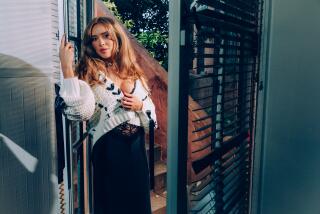POP MUSIC REVIEW : Dalton Just Too Tame and Tepid at Crazy Horse
- Share via
SANTA ANA — Lacy J. Dalton may have one of the grainiest, R&B-edged; female voices in country; at times she seems like a calico Bonnie Raitt. But unlike Raitt’s stormy performance at the Coach House earlier this year, Dalton’s stand at the Crazy Horse Steak House and Saloon on Monday evening seemed too pat and tame to do her throat justice.
Although she threatened several times during the 14-song show to “depart from the known or comfortable” and to “do something weird and natural for a change,” Dalton only served up mostly room-temperature performances (or awkwardly scripted exchanges with band members) that added no new spin to her recordings.
Actually, even though some of Dalton’s records suffer from a generic Nashville studio sound (particularly those produced under the heavy hand of Billy Sherrill), they still carry more personality and country flavor than was summoned by her four-piece band in concert. The Dalton Gang proved a competent crossover-based outfit but one lacking in both a personal stamp and a feel for country roots.
It follows that Dalton’s least affected moments came on the songs where she and her acoustic guitar were most at the fore. Of those, her “Old Soldier’s Eyes,” a song describing her first meeting with Waylon Jennings, showed the feeling and emotion of which Dalton’s voice is capable.
It was a long-mile better than the set’s other tune in which Jennings’ name was evoked, the smarmy “Hard Luck Aces” off her current “Survivor” album. Although the lyric celebrates such enduring outlaws as Jennings, Merle Haggard and Hank Williams Jr., the lackluster song and its delivery seemed more a salute to the tired Nashville formula the outlaws had opposed.
Along with “Silver Eagle,” “Hard Times,” “Dream Baby,” “Hillbilly Girl With the Blues” and other Dalton standards, she performed the “Survivor” album’s title track, “Don’t Make Them Like They Used To,” and Kris Kristofferson’s “The Heart.” Although that last tune, and the ballad “16th Avenue,” also afforded Dalton a chance to stretch emotionally, such moments were too few to elevate the otherwise tepid show.
More to Read
The biggest entertainment stories
Get our big stories about Hollywood, film, television, music, arts, culture and more right in your inbox as soon as they publish.
You may occasionally receive promotional content from the Los Angeles Times.








